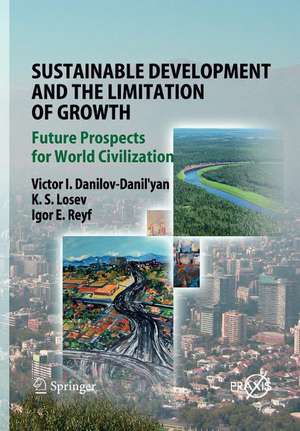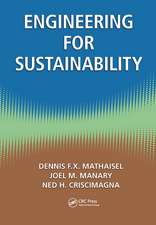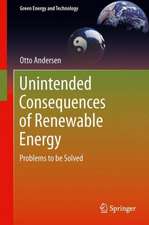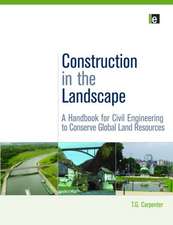Sustainable Development and the Limitation of Growth: Future Prospects for World Civilization: Springer Praxis Books
Autor Victor I. Danilov-Danil'yan, K. S. Losev, Igor E. Reyfen Limba Engleză Paperback – 30 noi 2010
The exclusive role of natural ecosystems is a key factor in the maintenance of the biospheric equilibrium. The current global crisis is largely caused by their dramatic decline by 43% in the past hundred years. Ignoring the immutable laws and limitations which determine the existence of all living things in the biosphere could lead humanity to an ecological catastrophe. This book presents the ecological, demographic, economic and socio-psychological manifestations of the global crisis and outlines the immutable laws and limitations which determine the existence of all living things in the biosphere.
| Toate formatele și edițiile | Preț | Express |
|---|---|---|
| Paperback (1) | 641.71 lei 6-8 săpt. | |
| Springer Berlin, Heidelberg – 30 noi 2010 | 641.71 lei 6-8 săpt. | |
| Hardback (1) | 650.69 lei 6-8 săpt. | |
| Springer Berlin, Heidelberg – 12 ian 2009 | 650.69 lei 6-8 săpt. |
Din seria Springer Praxis Books
-
 Preț: 294.46 lei
Preț: 294.46 lei -
 Preț: 223.45 lei
Preț: 223.45 lei -
 Preț: 193.12 lei
Preț: 193.12 lei -
 Preț: 167.85 lei
Preț: 167.85 lei -
 Preț: 288.98 lei
Preț: 288.98 lei -
 Preț: 323.74 lei
Preț: 323.74 lei -
 Preț: 376.08 lei
Preț: 376.08 lei -
 Preț: 264.12 lei
Preț: 264.12 lei - 8%
 Preț: 517.61 lei
Preț: 517.61 lei -
 Preț: 190.01 lei
Preț: 190.01 lei -
 Preț: 218.16 lei
Preț: 218.16 lei -
 Preț: 312.06 lei
Preț: 312.06 lei - 17%
 Preț: 401.17 lei
Preț: 401.17 lei -
 Preț: 216.41 lei
Preț: 216.41 lei -
 Preț: 262.27 lei
Preț: 262.27 lei -
 Preț: 264.35 lei
Preț: 264.35 lei -
 Preț: 167.63 lei
Preț: 167.63 lei -
 Preț: 259.52 lei
Preț: 259.52 lei -
 Preț: 259.08 lei
Preț: 259.08 lei -
 Preț: 305.47 lei
Preț: 305.47 lei -
 Preț: 234.01 lei
Preț: 234.01 lei -
 Preț: 227.85 lei
Preț: 227.85 lei -
 Preț: 259.95 lei
Preț: 259.95 lei -
 Preț: 295.56 lei
Preț: 295.56 lei -
 Preț: 357.17 lei
Preț: 357.17 lei -
 Preț: 275.79 lei
Preț: 275.79 lei -
 Preț: 257.08 lei
Preț: 257.08 lei -
 Preț: 349.71 lei
Preț: 349.71 lei -
 Preț: 272.45 lei
Preț: 272.45 lei -
 Preț: 270.27 lei
Preț: 270.27 lei - 8%
 Preț: 433.24 lei
Preț: 433.24 lei -
 Preț: 327.03 lei
Preț: 327.03 lei - 8%
 Preț: 394.80 lei
Preț: 394.80 lei -
 Preț: 320.65 lei
Preț: 320.65 lei -
 Preț: 325.29 lei
Preț: 325.29 lei -
 Preț: 253.11 lei
Preț: 253.11 lei -
 Preț: 192.86 lei
Preț: 192.86 lei -
 Preț: 313.40 lei
Preț: 313.40 lei -
 Preț: 150.51 lei
Preț: 150.51 lei -
 Preț: 233.34 lei
Preț: 233.34 lei -
 Preț: 286.78 lei
Preț: 286.78 lei -
 Preț: 212.01 lei
Preț: 212.01 lei -
 Preț: 366.83 lei
Preț: 366.83 lei -
 Preț: 274.68 lei
Preț: 274.68 lei -
 Preț: 232.27 lei
Preț: 232.27 lei -
 Preț: 284.58 lei
Preț: 284.58 lei -
 Preț: 212.45 lei
Preț: 212.45 lei -
 Preț: 159.81 lei
Preț: 159.81 lei -
 Preț: 349.48 lei
Preț: 349.48 lei - 20%
 Preț: 2061.61 lei
Preț: 2061.61 lei
Preț: 641.71 lei
Preț vechi: 754.95 lei
-15% Nou
Puncte Express: 963
Preț estimativ în valută:
122.82€ • 127.74$ • 102.93£
122.82€ • 127.74$ • 102.93£
Carte tipărită la comandă
Livrare economică 13-27 martie
Preluare comenzi: 021 569.72.76
Specificații
ISBN-13: 9783642094514
ISBN-10: 3642094511
Pagini: 284
Ilustrații: XIX, 262 p.
Dimensiuni: 170 x 242 x 15 mm
Greutate: 0.45 kg
Ediția:Softcover reprint of hardcover 1st ed. 2009
Editura: Springer Berlin, Heidelberg
Colecția Springer
Seriile Springer Praxis Books, Environmental Sciences
Locul publicării:Berlin, Heidelberg, Germany
ISBN-10: 3642094511
Pagini: 284
Ilustrații: XIX, 262 p.
Dimensiuni: 170 x 242 x 15 mm
Greutate: 0.45 kg
Ediția:Softcover reprint of hardcover 1st ed. 2009
Editura: Springer Berlin, Heidelberg
Colecția Springer
Seriile Springer Praxis Books, Environmental Sciences
Locul publicării:Berlin, Heidelberg, Germany
Public țintă
ResearchCuprins
Civilization in crisis: On the edge of an abyss.- Global ecological situation.- Critically overpopulated planet.- The ecological equivalents of modern man.- Civilization teetering over the abyss of crisis (conclusion).- The social dimension of the crisis.- The role of centralized and market economies.- The crisis of values as the main cause of the ecological challenge.- The world community: Politicians and scientists in search of a solution.- The mission of the Club of Rome.- Programs for change: Stockholm—Rio—Johannesburg.- Toward a systemic understanding of the biosphere.- The constancy of the planetary environment in light of the biotic regulation mechanism.- Sustainable development: Between complacency and reality.- The basis of sustainability in nature and in civilization.- The national colors of sustainable development.- Co-evolution of nature and society: Fact or fiction?.- On the scale of a scientific approach.- Sustainable development in relation to the carrying capacity of the biosphere.- The starting conditions of sustainable development and the preservation of ecosystems by country and continent.- Navigation directions: Indicators of sustainable development.- “Is there enough community, responsibility, discipline and love?” (Meadows et al., 1992).- The barricades of old thinking in the way of sustainable development.- What the market economy can and cannot accomplish.- Sustainable development and the “real human condition”.- The social premises of sustainable development and the globalization problem.
Recenzii
From the reviews:
"This timely, well-organized book provides intriguing insights into the 21st-century plight of the human-built and natural worlds. Danilov-Danil’yan and Losev (both, Russian Academy of Sciences) and Reyf (German journalist) argue that the direct dependence of people on critical ecosystem services requires … social, psychological, and economic trends that underpin the problem. The book’s six parts aptly reveal the breath and depth of the analysis … . Summing Up: Highly recommended. All levels/libraries." (P. R. Pinet, Choice, Vol. 46 (11), July, 2009)
"This timely, well-organized book provides intriguing insights into the 21st-century plight of the human-built and natural worlds. Danilov-Danil’yan and Losev (both, Russian Academy of Sciences) and Reyf (German journalist) argue that the direct dependence of people on critical ecosystem services requires … social, psychological, and economic trends that underpin the problem. The book’s six parts aptly reveal the breath and depth of the analysis … . Summing Up: Highly recommended. All levels/libraries." (P. R. Pinet, Choice, Vol. 46 (11), July, 2009)
Textul de pe ultima copertă
It is over 15 years since Agenda 21 was adopted in Rio de Janeiro,
and over 100 countries have now espoused this code to use
sustainable development as a means of avoiding an ecological
catastrophe. However it is obvious that, even with this
commitment, there is still a significant lack of both understanding
and action.
Sustainable Development and the Limitation of Growth presents the
ecological, demographic, economic and socio-psychological
manifestations of the global crisis, and outlines the immutable
laws and limitations which determine the existence of all living
things in the biosphere. The book
This unique work argues for a change in the sustainable
development paradigm, the strategic nucleus of which must be
the conservation of ecosystems, especially forests, still in existence
and the partial reconstruction of destroyed ecosystems, as well as
for an understanding of humanity’s real place in the natural
environment and the gravity of the ecological threat before us.
1
and over 100 countries have now espoused this code to use
sustainable development as a means of avoiding an ecological
catastrophe. However it is obvious that, even with this
commitment, there is still a significant lack of both understanding
and action.
Sustainable Development and the Limitation of Growth presents the
ecological, demographic, economic and socio-psychological
manifestations of the global crisis, and outlines the immutable
laws and limitations which determine the existence of all living
things in the biosphere. The book
- contends that sustainability is achievable only on a global scale
and cannot be regionalized or isolated; - demonstrates the need to move to a new way of thinking;
- shows humanity its real place in the natural environment;
- highlights the importance of global environmental stability.
This unique work argues for a change in the sustainable
development paradigm, the strategic nucleus of which must be
the conservation of ecosystems, especially forests, still in existence
and the partial reconstruction of destroyed ecosystems, as well as
for an understanding of humanity’s real place in the natural
environment and the gravity of the ecological threat before us.
1
Caracteristici
Addresses one of the most urgent and critical problems of our civilization Highlights the importance of global environmental stability Shows humanity its real place in the natural environment Emphasizes the gravity of the ecological threat before us Demonstrates the need to move from modern industrial thinking to new ecological thinking Takes a holistic approach to the global economic crisis Contends that sustainability is achievable only on a global scale and cannot be regionalized or isolated Portrays the economic, social and ethical consequences of the violation of biospherical laws Includes supplementary material: sn.pub/extras










